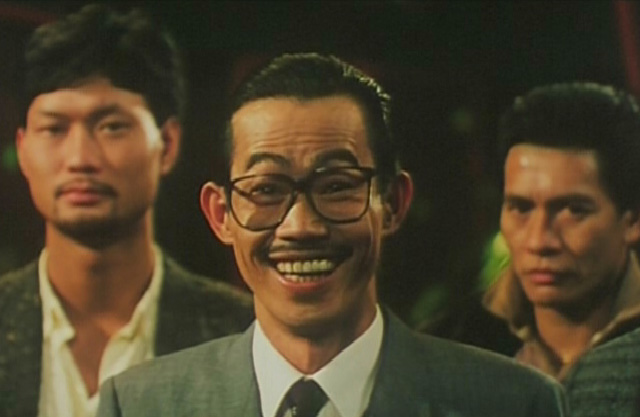
Yuen Wah
Biographical Essay by Yves Gendron
Hong Kong cinema has produced many magnificent
villains over the years; players who through their screen presence, acting
chops, physical abilities and picturesque mugs made such an impression
that they have indelibly marked their era. Thus Shek Kin will always be
considered as the fifties and sixties Cantonese cinema ruling bad guy while
Lo Lieh will forever be remembered as the Shaw Brother Studio’s most wicked
villain.
 Then there was Yuen Wah, the top movie fiend of
H-K cinema’s great golden period of the early Eighties to early Nineties.
A superb acrobatic screen-fighter, Wah’s abilities along with a lean wiry
body, a distinguishing moustache and a brilliant talent for quirky characterisation
all contributed to making him the standout movie villain of his age. A
Peking Opera Academy brother of H-K action stars Jackie Chan, Sammo Hung,
and Yuen Biao, Yuen Wah’s breakthrough came at a much later date then his
brethren and with a totally different screen-persona as them but he became
nearly as famous and iconic.
Then there was Yuen Wah, the top movie fiend of
H-K cinema’s great golden period of the early Eighties to early Nineties.
A superb acrobatic screen-fighter, Wah’s abilities along with a lean wiry
body, a distinguishing moustache and a brilliant talent for quirky characterisation
all contributed to making him the standout movie villain of his age. A
Peking Opera Academy brother of H-K action stars Jackie Chan, Sammo Hung,
and Yuen Biao, Yuen Wah’s breakthrough came at a much later date then his
brethren and with a totally different screen-persona as them but he became
nearly as famous and iconic.
 Able to play all sorts of rascals from snivelling
weasels to cigar-puffing crime bosses to maniac killers (often styling
his moustache differently from one movie to another), Wah could also do
each in a variety of fashions; sneaky, edgy, chilling, camp and all at
once if needed. But while he’s chiefly known for his wily, acrobatic
villains there is more to him. At least half of his movie career
was spent as a dependable stuntman, stunt-double and action choreographer
and as such he was a major contributor behind the action spectacles done
on dozens of Shaw Brother and Sammo Hung movies. Further, while his villainous
roles usually called for a lot of overacting he could also do, when the
occasion required it, more sympathetic, goofy or genuinely touching sort
of roles as well
Able to play all sorts of rascals from snivelling
weasels to cigar-puffing crime bosses to maniac killers (often styling
his moustache differently from one movie to another), Wah could also do
each in a variety of fashions; sneaky, edgy, chilling, camp and all at
once if needed. But while he’s chiefly known for his wily, acrobatic
villains there is more to him. At least half of his movie career
was spent as a dependable stuntman, stunt-double and action choreographer
and as such he was a major contributor behind the action spectacles done
on dozens of Shaw Brother and Sammo Hung movies. Further, while his villainous
roles usually called for a lot of overacting he could also do, when the
occasion required it, more sympathetic, goofy or genuinely touching sort
of roles as well

Kung Fu Wonder Child
Yuen Wah was born Yung Kai-chi in Hong-Kong
on September 2. Here is how he got into Master Yu Jim-yuen’s China Drama
Academy as he told it in an interview, ” (…) when I was young I liked
action movie (…). After watching action movies I would imitate the kung-fu
movies at home. My brothers and sisters (..) were my punch-bags. At school
I would fight with my class-mates. The school told my mum that I was too
naughty. That I was always watching and practising kung-fu. So my mum said
okay okay since you like kung-fu, I send you to a place to learn it ”(1).
He was enrolled at about 7 or 8 years of age for a standard ten year contract.
At the time of his arrival both Sammo Hung and Corey Yuen were already
there but not Jackie Chan nor Yuen Biao. As with all pupils of the Academy,
young Kai-chi was given a new name, Yuen Wah, Yuen to honour his
new master and Wah which means China or brilliant(-looking). (2)
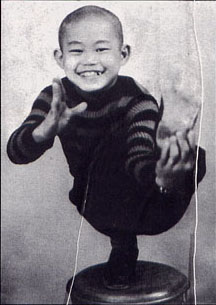
Wah went through the gruelling training regiment
meant to make top Opera performers. Even as a kid he already exhibited
some astonishing aptitude that held his fellow opera students in awe including
Jackie himself. “When we did freeze practice, he’d still be as
motionless as a statue long after the rest of us collapsed. He could stand
on his hand indefinitively. In fact once, when master told us to take a
break he kept on going head to the ground until someone realized that he’d
actually fallen asleep upside down”(3).
He also had a mastery of martial stances and forms that allowed him to
pick up any fancy moves with a disarming ease and smoothness. A wonderful
acrobat and contortionist, Wah was reportedly Master Yu’s best flipping
tumbler. Needless to say he had no problem being chosen by him when Yu
selected his top students to form the Seven Little Fortunes kiddie troupe.
Performing for the stage and occasionally for the screen in martial-art
movies, Wah thus fulfilled his kung-fu fantasy though after having gone
through a far more arduous time that he could have possibly ever imagined.
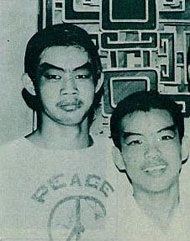 Like the other Fortunes, Wah’s budding Peking
Opera prospects did not survive the popular decline of the art.
Like the other Fortunes, Wah’s budding Peking
Opera prospects did not survive the popular decline of the art.
From their mid-teens on most of them had to
become movie stuntmen, where thanks to the then surging martial-art movie
trend there was plenty of work to be found for qualified daredevil acrobats.
Eventually, Wah along with many of his Peking Opera Academy brethren joined
Golden Harvest’s stunt-crew which was led by the Little Fortunes most senior
member; big brother Sammo Hung.
In the Shadow of the Dragon
It was soon after Wah joined that Golden Harvest
began preparation on the second movie by their newly established kung-fu
superstar, Bruce Lee. On FIST OF FURY (72) a good dozen stuntmen were used
as punching foils for the Little Dragon’s fiery rage, most notably for
the film’s famed dojo scene. Yuen Wah himself appeared later on in the
equally classic “No dogs and Chinese allowed” park scene as a smirking
Japanese who is at the receiving end of Bruce’s fist after unwisely spouting
a denigrating insult. Having the same body type as Bruce, wiry but muscular,
Wah was also selected to be his designated acrobatic stunt-double. As fight
scenes were staged on the spot, it was a wise move to have a double picked
from the start. Yet as Bruce Lee’s screen fighting magic laid in pure kung-fu
displays and not in fancy acrobatics, Wah ending-up doubling Lee only once
for a somersault performed in the movie's last fight scene.
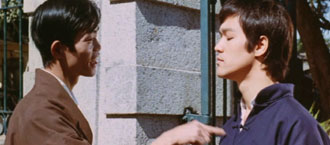 The following year Wah was picked up again as
a double for Lee’s fourth and final completed k-f movie ENTER
The following year Wah was picked up again as
a double for Lee’s fourth and final completed k-f movie ENTER
THE DRAGON(73). He doubled him at least three
times in this one. First for a snappy back-flip performed during the Bruce
vs. Sammo fight that opens the film. Then there was the big somersault
over the monks that cap the same scene. Finally, during the Lee vs. reviled
Caucasian henchmen O’Hara duel, he’s the one who does a back-flip kick.
In ENTER Wah also served as a fight extra being trounced by Lee on more
than one occasion. He was also one of the guests grabbing a thrown apple
in the movie’s banquet scene. Bruce had a big project for the future including
starting filming movies in the United States. He had even selected ten
capable stuntmen to help him do the action scenes and both Lam Ching-ying
and Yuen Wah were among those chosen. Naturally, Bruce Lee’s sudden passing
meant that both Lam and Wah stayed on as part of Golden Harvest’s stunt-crew.
 Besides serving as a daredevil stuntman, Wah’s
remarkable set of physical abilities together with his tall wiry frame
made him a valued stunt-double and fighting foil. He also had another asset
going for him; his angular, weasily face which he could easily shape into
an intimidating mug or arrogant sneer. That’s likely what got him his smirking
Japanese bit in FIST OF FURY as well as dozens of other tiny gigs over
the years as thugs, henchmen and rowdy types that got into the heroes way
and was trounced as a result. Between 1972 and 1977 Wah appeared, usually
fleetingly, in nearly a dozen Golden Harvest martial art/action productions
including BACK ALLEY PRINCESS and NONE BUT THE BRAVE (both 73) starring
fighting female stars Polly Shang Kwan Ling-feng and Cheng Pei Pei respectively,
the Angela Mao action vehicles STONER, TOURNEMENT (both 74), THE HIMALAYAN
(76) and BROKEN OATH (77), King Hu’s VALIANT ONES (75) as well as John
Woo’s early kung-fu movies; DRAGON TAMERS (75) and HAND OF DEATH (76).
Except for the first two, all the action choreography in these films was
done by big brother Sammo.
Besides serving as a daredevil stuntman, Wah’s
remarkable set of physical abilities together with his tall wiry frame
made him a valued stunt-double and fighting foil. He also had another asset
going for him; his angular, weasily face which he could easily shape into
an intimidating mug or arrogant sneer. That’s likely what got him his smirking
Japanese bit in FIST OF FURY as well as dozens of other tiny gigs over
the years as thugs, henchmen and rowdy types that got into the heroes way
and was trounced as a result. Between 1972 and 1977 Wah appeared, usually
fleetingly, in nearly a dozen Golden Harvest martial art/action productions
including BACK ALLEY PRINCESS and NONE BUT THE BRAVE (both 73) starring
fighting female stars Polly Shang Kwan Ling-feng and Cheng Pei Pei respectively,
the Angela Mao action vehicles STONER, TOURNEMENT (both 74), THE HIMALAYAN
(76) and BROKEN OATH (77), King Hu’s VALIANT ONES (75) as well as John
Woo’s early kung-fu movies; DRAGON TAMERS (75) and HAND OF DEATH (76).
Except for the first two, all the action choreography in these films was
done by big brother Sammo.
 Like most of Sammo’s stuntmen Wah regularly strayed
away from the Harvest studio lot and at least on a couple of occasions
ended-up working for a gifted freelance action director named Yuen Woo-ping.
AWAKEN PUNCH and FIST TO FIST (both 73 and the latter being reportedly
John Woo’s actual directorial debut) are the two reported Yuen choreographed
movies Wah is seen in. In all the HKMDB credits Yuen Wah with two dozen
movie appearances between 1972 and 1977 but this is likely just the tip
of the iceberg of his actual cinematic contributions.
Like most of Sammo’s stuntmen Wah regularly strayed
away from the Harvest studio lot and at least on a couple of occasions
ended-up working for a gifted freelance action director named Yuen Woo-ping.
AWAKEN PUNCH and FIST TO FIST (both 73 and the latter being reportedly
John Woo’s actual directorial debut) are the two reported Yuen choreographed
movies Wah is seen in. In all the HKMDB credits Yuen Wah with two dozen
movie appearances between 1972 and 1977 but this is likely just the tip
of the iceberg of his actual cinematic contributions.
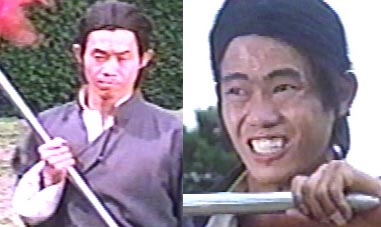 Most stuntmen spend a considerable amount of time
in developing new tricks to make themselves even more versatile and useful
for the action directors who employed them. Wah’s aforementioned mastery
at martial art forms meant that he was especially proficient at learning
various types of kung-fu and adapt them into savvy screen-fighting moves
that were both graceful and spectacular, which he could then use himself
in movies or show to other stuntmen. His repertoire included among others
Eagle Claws, Taekwendo, Bak Mei and various sorts of Southern Fists techniques.
In time, Wah came to adopt for himself a mixed Taekwendo kicks/Eagle Claws
as his signature screen fighting style; an ingenious combo that wonderfully
played not only with his aptitude in kung-fu forms and acrobatics
but with his wiry framed and long spidery limbs and fingers as well. He
also extensively practised with various sorts of weapon manoeuvres. Wah’s
phenomenal talents allowed him to quickly, even instantaneously learn tricky
acrobatic moves developed by other stuntmen as Wah himself revealed in
an interview. “One of my friends trained secretly for about a week, to
show me his one-handed back-flip. Normally such moves required two hands.
He flipped using one hand, followed by a somersault in the air. I said
“Is that all? I'll try and see if I can do it.” I push off and
I did five flips at one go. “You are not human (The friend said) I’m not
playing with you anymore ”.(4)
Most stuntmen spend a considerable amount of time
in developing new tricks to make themselves even more versatile and useful
for the action directors who employed them. Wah’s aforementioned mastery
at martial art forms meant that he was especially proficient at learning
various types of kung-fu and adapt them into savvy screen-fighting moves
that were both graceful and spectacular, which he could then use himself
in movies or show to other stuntmen. His repertoire included among others
Eagle Claws, Taekwendo, Bak Mei and various sorts of Southern Fists techniques.
In time, Wah came to adopt for himself a mixed Taekwendo kicks/Eagle Claws
as his signature screen fighting style; an ingenious combo that wonderfully
played not only with his aptitude in kung-fu forms and acrobatics
but with his wiry framed and long spidery limbs and fingers as well. He
also extensively practised with various sorts of weapon manoeuvres. Wah’s
phenomenal talents allowed him to quickly, even instantaneously learn tricky
acrobatic moves developed by other stuntmen as Wah himself revealed in
an interview. “One of my friends trained secretly for about a week, to
show me his one-handed back-flip. Normally such moves required two hands.
He flipped using one hand, followed by a somersault in the air. I said
“Is that all? I'll try and see if I can do it.” I push off and
I did five flips at one go. “You are not human (The friend said) I’m not
playing with you anymore ”.(4)
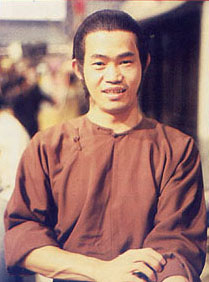
It was around the mid-seventies that one of
Wah’s big stunt-mishaps occurred “I was doing an old swordplay movie
and had to jump from the fifth or sixth floor of a pagoda. Rehearsals were
fine, then we break for lunch. Then we filmed the stunt. So I ran and jump
from the pagoda and just as I jump, I realized that people had moved the
crash mats to sit on them during lunch and had not put them back. I try
to turn around in mid air but BOOOOM, I hit the ground and made a hole
and hurt myself quite badly ”. (5)
Another memorable mishap that befell Wah also
involved a fall from a great height. “The most memorable scene was to
jump into the sea from a helicopter. I was holding two bags of heroin and
being chased by somebody. So I had to jump into the sea. When I was in
the water and because of the water I felt like somebody was hitting my
chest with a hammer. It felt terrible. Later I came out of the water, I
could not speak for two hours. Somebody got me some Brandy; I drank which
helped better blood circulation. In the end my neck was swollen. My face
was terribly blown-up. That was something unforgettable ”. (6)
Wah in Shaw Movie Land
1976 saw a new stage in Wah’s career and the
beginning of the second most important working relationship of his career
(after Sammo). That year saw Yuen Wah, along with Fortune brothers Biao
and Kwai going constantly back and forth between Sammo’s team and the Shaw
Brother’s “Movie Land”, the nickname for the studio’s large cinematic facilities.
He worked primarily on the crew of one of Shaw’s top house action choreographers,
Tong Gaai (also known as Tang Chia). Finally after about a year and
a half, Wah left Sammo’s team and settled permanently with Tong having
become one of his key assistants and his own special secret weapon.
There were at least three stunt-units at Shaw.
One for the movies of Chang Cheh, the second headed by action choreographer
turned director Lau Kar-leung for his own films and a third led by Lau’s
former action director partner Tong Gaai who worked for whatever director
the Shaw Studio bosses assigned him to. While movies by
Chang Cheh and Lau showcased lead players
that were mostly seasoned martial artists or acrobats (the Venoms, Gordon
Lau, Hsiao Hou) the movies Tong worked on starred actors who for the most
part had limited
(if existent at all) martial expertise and
physical capabilities - hence a high reliance on stunt-doubles. It’s this
crucial but tricky field that Wah truly excelled in and he proved himself
an invaluable human tool in Tong’s arsenal. Ti Lung, Lo Lieh and Liu Yung
(aka Tony Lau) were some of the Shaw stars that Wah is known to have doubled
and there were many others. Wah's seamless stunt doubling could be anything
from a mere split-second flip to a prolonged sword duel. At times Wah probably
did action scenes where he doubled both the two actors engaged in a fight
together by replacing them alternatively one shot after the other.
Wah’s stay at Shaw lasted for more than eight
years. He was involved in thirty three reported movies (though his actual
number is likely higher) with the bulk of them but not all choreographed
by Tong Gaai. The list includes most of the martial art films done between
1976 and 1984 by such Shaw directing luminaries as Chor Yuen (KILLER CLANS,
MAGIC BLADE etc), Suen Chung (AVENGING EAGLE, DEADLY BREAKING SWORD etc)
and Ho Mung-wa (SWIFTEST SWORD). In all Wah must have performed on
screen in as many action feats and screen fights as his three famed Fortune
brothers Jackie, Sammo and Biao, in their own films, but doubling for someone
else and therefore only seen from afar, from behind or in disguise.
 Although he was no doubt one of Shaw’s most proficient
stunt-doubles, (if not the best outright) Wah wasn’t the only one so it’s
nearly impossible to readily identify most of the doubling jobs Wah has
done over the years. There is one noteworthy exception though. In Shaw’s
swordplay horror HUMAN LANTERN (82) lead villain Lo Lieh donned a fearsome
looking outfit that disguises him into a half ape half lion prowling wild
beast. For the most part it seemed it was Wah under that get up - both
fighting and moving in an animal-like manner using his uncanny knack at
acrobatics, physical contortion and pantomime.
Although he was no doubt one of Shaw’s most proficient
stunt-doubles, (if not the best outright) Wah wasn’t the only one so it’s
nearly impossible to readily identify most of the doubling jobs Wah has
done over the years. There is one noteworthy exception though. In Shaw’s
swordplay horror HUMAN LANTERN (82) lead villain Lo Lieh donned a fearsome
looking outfit that disguises him into a half ape half lion prowling wild
beast. For the most part it seemed it was Wah under that get up - both
fighting and moving in an animal-like manner using his uncanny knack at
acrobatics, physical contortion and pantomime.
HUMAN LANTERN also saw what Wah would later
recall as one of his most memorable stunts gone wrong “I was a double
for Liu Ying (one of the film’s lead actors) and was supposed to jump out
from an underground hole. (…) Lo Lieh was holding a long bamboo stick with
its end sharpened. The moment I jump out he throws the stick at me. That
bamboo stick was shot out from an elastic wire. I was suppose to jump away
(…) I saw the stick coming right into my eyes. I immediately turned away
from it and it got into my back. (…) It looked like I had been impaled.(…)
They (the people on the set) thought I was dead because they thought the
stick got into my heart. (…). My whole body was paralysed. Later
someone cut the stick into a short one. I went to the hospital with the
stick in”. It turned out the stick only penetrated one inch into Wah’s
body and he only needed a few stitches. According to Wah though, had he
not suddenly turned away the stick might have well come through the head
and got out from the back. “That was unforgettable. Really scared me
”. (7)
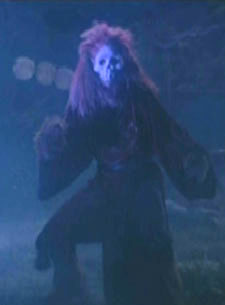 The steady work at Shaw probably brought a stability
in Wah’s life that few stuntmen enjoy, but it was not without a price.
Having married and started a family, his heavy workload meant he did not
have much time for them. “The studio was just like my home I spend
more time at work than at home. (…) When I got home my kids were all in
bed. And when I got up they were all off to school. They didn’t see me.
I didn’t get to see them either. And that was my life .”(8)
The steady work at Shaw probably brought a stability
in Wah’s life that few stuntmen enjoy, but it was not without a price.
Having married and started a family, his heavy workload meant he did not
have much time for them. “The studio was just like my home I spend
more time at work than at home. (…) When I got home my kids were all in
bed. And when I got up they were all off to school. They didn’t see me.
I didn’t get to see them either. And that was my life .”(8)
Wah’s start at Shaw coincided with the emergence
of both kung-fu comedy and of a new generation of leading martial-art players.
Thus Yuen Woo-ping, Sammo Hung and Jackie Chan all went from stuntmen and
action choreographers to directors and/or kung-fu stars within a year and
a half. Dozens of stuntmen and fight extras also became picturesque kung-fu
movie players; villains, lead henchmen, comic sidekicks or wizened kung-fu
masters. Fung Hark-on, Chin Yuet San and nearly all of the Yuen Clan, to
name just a few, were part of this colourful kung-fu gallery. Back at Shaw
both Chang Cheh and Lau did push a handful of screen-savvy stuntmen into
either lead or major supporting roles (the Venom team for Chang, Hsiao
Hou for Lau). However, as stated before, movies choreographed by Tong Gaai
featured mostly actors and therefore stayed outside the “stuntmen as kung-fu
movie hero/star” upheaval that was unfolding in martial art cinema.
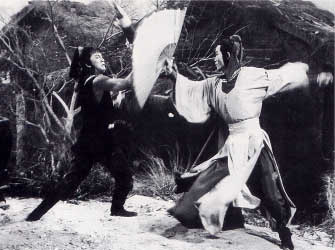 It’s most tantalising to consider what could have
happened to Wah’s career had he not gone to Shaw and stuck with Sammo as
the latter became one of kung-fu comedy’s leading stars and directors.
He might have given him a juicy major villainous part in one of his movies
and Wah could have been discovered far earlier than 1987 to become one
of these delightful k-f bad guys. This is wishful speculation of course.
After all, not all of the stuntmen became major players, only a handful
did.
It’s most tantalising to consider what could have
happened to Wah’s career had he not gone to Shaw and stuck with Sammo as
the latter became one of kung-fu comedy’s leading stars and directors.
He might have given him a juicy major villainous part in one of his movies
and Wah could have been discovered far earlier than 1987 to become one
of these delightful k-f bad guys. This is wishful speculation of course.
After all, not all of the stuntmen became major players, only a handful
did.
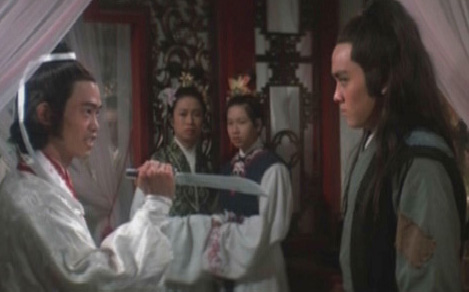 This said, although Wah did miss the stuntman
as star bandwagon that carried many of his brethren to greater fame that
doesn’t mean his work at Shaw denied him opportunities to be in the spotlights.
Far from it. Although a good portion of his frequent screen appearances
in Shaw movies did consist of quick and almost unrecognizable parts, over
the years he also made at least a dozen tiny but eye-catching appearances
as thugs, swordsman, guard or assassins that nicely displayed him in dapper-looking
period costumes and deft combat scenes. The movies where he was featured
in such a way include CLAN OF INTRIGUES, (as a Japanese Ninja), SENTIMENTAL
SWORDSMAN (swordsman Yu Lung-cheng ), LEGEND OF THE BAT (a mute bodyguard),
SWORDSMAN AND THE ENCHANTESS, SOUL OF THE SWORD (white bearded body-guard)
KILLER CONSTABLE (swordsman in red), HEROES SHED NO TEARS (Mu Chi killer)
and THE EMPEROR AND HIS BROTHER (No 6). With the beginning of the Eighties
Shaw made two k-f comedy tryouts where Wah was reportedly given more extended
roles. One was COWARD BASTARD starring one of Wah’s fellow Fortune brothers,
Meng Yuen-man, while the other KID WITH A TATOO cast Wah as a spear-wielding
assassin. This latter film saw him fight another Fortune brother Yuen Bun
as well as clash with Shaw’s great kung-fu screen villain Wang Lung Wei.
All these bit roles did not change Wah’s overall status at Shaw though
and he remained a stuntman who only participated in tiny parts.
This said, although Wah did miss the stuntman
as star bandwagon that carried many of his brethren to greater fame that
doesn’t mean his work at Shaw denied him opportunities to be in the spotlights.
Far from it. Although a good portion of his frequent screen appearances
in Shaw movies did consist of quick and almost unrecognizable parts, over
the years he also made at least a dozen tiny but eye-catching appearances
as thugs, swordsman, guard or assassins that nicely displayed him in dapper-looking
period costumes and deft combat scenes. The movies where he was featured
in such a way include CLAN OF INTRIGUES, (as a Japanese Ninja), SENTIMENTAL
SWORDSMAN (swordsman Yu Lung-cheng ), LEGEND OF THE BAT (a mute bodyguard),
SWORDSMAN AND THE ENCHANTESS, SOUL OF THE SWORD (white bearded body-guard)
KILLER CONSTABLE (swordsman in red), HEROES SHED NO TEARS (Mu Chi killer)
and THE EMPEROR AND HIS BROTHER (No 6). With the beginning of the Eighties
Shaw made two k-f comedy tryouts where Wah was reportedly given more extended
roles. One was COWARD BASTARD starring one of Wah’s fellow Fortune brothers,
Meng Yuen-man, while the other KID WITH A TATOO cast Wah as a spear-wielding
assassin. This latter film saw him fight another Fortune brother Yuen Bun
as well as clash with Shaw’s great kung-fu screen villain Wang Lung Wei.
All these bit roles did not change Wah’s overall status at Shaw though
and he remained a stuntman who only participated in tiny parts.
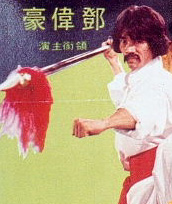 It was in action staging that Yuen Wah was able
to climb ladders as he became one of Tong Gaai’s chief action assistants.
He was officially first credited as assistant action director for THE EMPEROR
AND HIS BROTHER (81) although he had probably started handling major action
staging chores at a much earlier date. Tong Gaai’s own directorial debut
SHAOLIN PRINCE (83) saw Wah graduate to fully fledged action director.
Finally in 1984 Wah made it as chief action director on two movies; SUPREME
SWORDSMAN and LUST FROM LOVE OF A CHINESE COURTESAN in partnership with
Yuen Bun.
It was in action staging that Yuen Wah was able
to climb ladders as he became one of Tong Gaai’s chief action assistants.
He was officially first credited as assistant action director for THE EMPEROR
AND HIS BROTHER (81) although he had probably started handling major action
staging chores at a much earlier date. Tong Gaai’s own directorial debut
SHAOLIN PRINCE (83) saw Wah graduate to fully fledged action director.
Finally in 1984 Wah made it as chief action director on two movies; SUPREME
SWORDSMAN and LUST FROM LOVE OF A CHINESE COURTESAN in partnership with
Yuen Bun.
Unfortunately, Wah’s steady set of promotions
coincided with Shaw’s rapid decline as a filmmaking power. Indeed by the
early Eighties, things had really soured for Shaw. Once Hong Kong’s ruling
studio, it began in the late seventies to lose its footing. What had begun
as a slide turned by the early Eighties into free fall. With its heavy
handed and antiquated studio system Shaw could not cope with the new stars,
trends, emerging rival film companies and filming methods that were developing
in Hong Kong cinema at the time and pushing it to a new level of scale
and sophistication. Unable to reverse their plummeting fortunes, the Shaw
bosses finally shut down its movie making operation in 1985, the year that
is widely considered as the unofficial closure of the Old-school martial-art
era.
Hung Kar Pan Wah Pow
By that time however, Yuen Wah had already
gone back to big brother Sammo to become part of his “Hung Kar Pan” (Hung
Stunt Group). Since the emergence of kung-fu comedy Sammo had proven himself
as both a popular star as well as one of the most talented directors and
action-choreographers the k-f movie genre ever had. Once k-f- comedy ran
its course, Sammo switched to the new top trend of the early Eighties;
stunt-oriented urban action capers. CARRY ON PICKPOCKET (82) came first
followed by WINNERS AND SINNERS (83) which were both tremendous box-office
hits and firmly established Sammo as one of H-K’s leading cinema forces.
By 1984 Sammo was making movies for both Golden Harvest as well as D&B,
a newly establish film production company, and was on the verge of establishing
his own; Bo Ho Films Corporation. He was not only starring, directing and
choreographing but producing movies as well which starred close associates
of his such as Yuen Biao, Richard Ng and Lam Ching-ying. With such a frenzied
output of activity, Sammo needed help to carry on such a multitude of projects
and Yuen Wah with his great expertise in both action choreography and stunt-doubling
must have been welcomed with open arms by his big brother.
Yuen Wah thus joined Lam Ching-ying, Yuen Biao,
Billy Chan Wu-ngai, Meng Hoi and Corey Yuen in Sammo’s team of action directing
acolytes whose task was either to assist Sammo with the action in his own
directed efforts such as OWL VS DUMBO (84), MY LUCKY STARS, HEART OF DRAGON
(85) or were the action directors in the movies he produced such as THOSE
MERRY SOULS and MR VAMPIRE (also 85). Wah still acted as stunt-double extraordinaire
and it was while doubling Sammo's regular player Lau Kar-Wing for a spectacular
pratfall in MY LUCKY STAR that he badly hit his head against a glass table
he was crashing into and got knocked out.
 Wah also regularly appeared in Sammo's productions
though usually in background bits such as MY LUCKY STARS (fleetingly glimpsed
as a gangster henchman), MILLIONNAIRE EXPRESS (as one of Eric Tsang’s prison
stripes cronies) and WHERE’S OFFICER TUBA (part of an extortion gang).
His biggest early role in a Sammo film was as one of Jackie Chan’s Swat-team
buddies in HEART OF DRAGON where he got a couple of lines to say, showed
a couple of moves and did a dangerous looking freefall.
Wah also regularly appeared in Sammo's productions
though usually in background bits such as MY LUCKY STARS (fleetingly glimpsed
as a gangster henchman), MILLIONNAIRE EXPRESS (as one of Eric Tsang’s prison
stripes cronies) and WHERE’S OFFICER TUBA (part of an extortion gang).
His biggest early role in a Sammo film was as one of Jackie Chan’s Swat-team
buddies in HEART OF DRAGON where he got a couple of lines to say, showed
a couple of moves and did a dangerous looking freefall.
 Wah was called to play another fearsome creature
(after his turn in HUMAN LANTERN years earlier) for the now classic MR
VAMPIRE; as a rotting faced, hopping stiff ghoul or Gyoshi as the Chinese
themselves called those walking death creatures. The movie is famous for
having given Lam Ching-ying his beloved signature role of the wise and
noble Taoist exorcist , but Yuen Wah also had an important role in the
movie both on screen and off. Besides playing the Gyoshi he was also the
film’s co-action director along with Lam Ching-ying. For the role Wah had
to wear gruesome looking (and quite likely highly uncomfortable) make-up,
being hit by furniture and to take all sort of falls including being pulled
hard from behind by wires while remaining always in unfazed stiff corpse
character and howling at his intended prey. It paid off as Wah’s
Gyoshi come across as one of the more frightening ghouls to ever grace
Hong-Kong horror cinema. From Chinese zombies Wah went on to a Terminator-like
robot killer in FINAL TEST (87). A rare H-K movie foray into SF fiction,
the film made good use of Wah’s talent at quirky characterisation and pantomime
and foreshadowed his later turn at unassuming looking/lethally skilled
opponents.
Wah was called to play another fearsome creature
(after his turn in HUMAN LANTERN years earlier) for the now classic MR
VAMPIRE; as a rotting faced, hopping stiff ghoul or Gyoshi as the Chinese
themselves called those walking death creatures. The movie is famous for
having given Lam Ching-ying his beloved signature role of the wise and
noble Taoist exorcist , but Yuen Wah also had an important role in the
movie both on screen and off. Besides playing the Gyoshi he was also the
film’s co-action director along with Lam Ching-ying. For the role Wah had
to wear gruesome looking (and quite likely highly uncomfortable) make-up,
being hit by furniture and to take all sort of falls including being pulled
hard from behind by wires while remaining always in unfazed stiff corpse
character and howling at his intended prey. It paid off as Wah’s
Gyoshi come across as one of the more frightening ghouls to ever grace
Hong-Kong horror cinema. From Chinese zombies Wah went on to a Terminator-like
robot killer in FINAL TEST (87). A rare H-K movie foray into SF fiction,
the film made good use of Wah’s talent at quirky characterisation and pantomime
and foreshadowed his later turn at unassuming looking/lethally skilled
opponents.
 By 1987 Yuen Wah had been doing movies for nearly
twenty years and appeared in more than sixty productions.
By 1987 Yuen Wah had been doing movies for nearly
twenty years and appeared in more than sixty productions.
Yet movies where he had more than one line
to say amounted to less than a handful. So although very active and respected
by his fellow stuntman/action choreographer peers as well as many martial
art directors, he had remained otherwise a fairly obscure figure to the
viewing public at large. Had he left the movies at that date no viewers
would have ever notice he had gone.
It’s Wwwaaaahhhh Time
It’s at this point though that big Brother
Sammo thought that Wah was ripe for a major screen role. Reaching his mid-thirties,
age had sharpened Wah's features and now with the addition of a moustache,
his face took on a character and intensity that had been lacking in his
younger days. For his Vietnam war actioner EASTERN CONDORS (July 87) Sammo
carefully designed Wah’s role of a Mao-suit dressed Vietcong commander
to fully display his many talents, take advantage of his peculiar
look and pull-off one of the film’s biggest surprise twists. Sammo explained
once in an interview; “I thought of this character who wasn’t so much
powerful as tricky and skilled in kung-fu. I showed him (Wah) how to act,
how to giggle, move his head and body.”(9)
Wah also prepared himself by watching a lot of Western movies featuring
very evil SS and Gestapo types “I took some of the mannerisms and characteristics
and combined them with my own ideas for this role."(10)
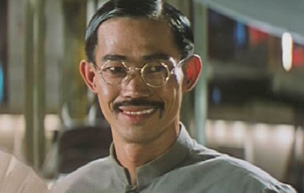 Yuen Wah only appeared late in the movie, had
less than 10 minutes of screen time and only had three brief lines, but
the way he looked, acted and moved was imminently eye catching. A gangly
spectacled man, surrounded by tough army goons, perpetually fanning himself
and displaying both a silly grin and wicked giggles, Wah’s Vietcong commander
was all at once unnervingly creepy yet oddly comical, a quirky double act
meant to keep the viewing audience off-balance and guessing. While reminiscent
of those smirking wimpy little villains frequently found in old kung-fu
movies, there was however something unsettlingly ominous about Wah’s character.
Yuen Wah only appeared late in the movie, had
less than 10 minutes of screen time and only had three brief lines, but
the way he looked, acted and moved was imminently eye catching. A gangly
spectacled man, surrounded by tough army goons, perpetually fanning himself
and displaying both a silly grin and wicked giggles, Wah’s Vietcong commander
was all at once unnervingly creepy yet oddly comical, a quirky double act
meant to keep the viewing audience off-balance and guessing. While reminiscent
of those smirking wimpy little villains frequently found in old kung-fu
movies, there was however something unsettlingly ominous about Wah’s character.
 Even so, it still comes as a complete surprise
when during the film’s final showdown, faced by Yuen Biao, instead of turning
craven yellow the commander responds by a masterful kick that brutally
floors Biao to the ground. “Waaahh” utters a totally shocked and
stunned Biao following this “Wah moment”, the first of many in the years
to come. Of course the non-threatening prey that turns out to actually
be a deadly k-f fighter is an old favourite trick by Sammo which he had
used many times before (most notably with Lam Ching-ying in PRODIGAL SON
and Michiko Nishiwaki in MY LUCKY STARS) but never quite sold as masterfully
as here.
Even so, it still comes as a complete surprise
when during the film’s final showdown, faced by Yuen Biao, instead of turning
craven yellow the commander responds by a masterful kick that brutally
floors Biao to the ground. “Waaahh” utters a totally shocked and
stunned Biao following this “Wah moment”, the first of many in the years
to come. Of course the non-threatening prey that turns out to actually
be a deadly k-f fighter is an old favourite trick by Sammo which he had
used many times before (most notably with Lam Ching-ying in PRODIGAL SON
and Michiko Nishiwaki in MY LUCKY STARS) but never quite sold as masterfully
as here.
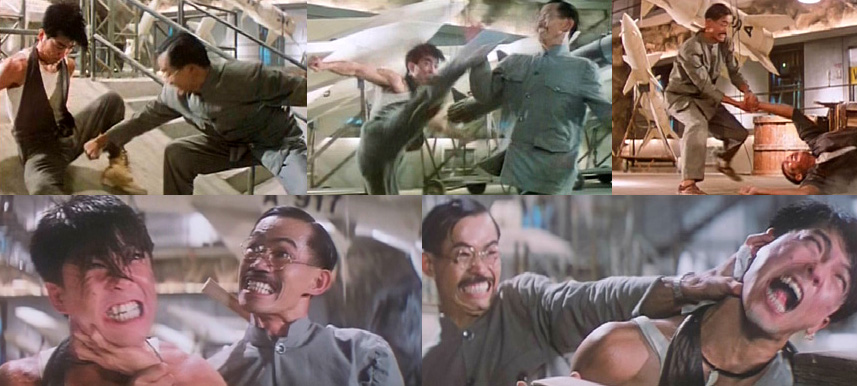 Setting aside his prop fan and handkerchief Wah’s
commander is no longer the feeble looking wimp but a lethal fighting fiend
who mercilessly trounces Biao by using Eagle Claws. Then a lean and mean
looking Sammo enters and what follows is an all too brief but thrilling
clash between Sammo’s kung-fu powerhouse and Wah the springy k-f trickster
for the film’s final action show-stopper. By the end of it the commander
is all bruised and battered (though he still had a dirty trick up his Eagle
Claw hand) but Wah the until now obscure stuntman and seamless screen-double
had at long last had his career changing breakthrough and nothing would
be the same for him again (11).
Setting aside his prop fan and handkerchief Wah’s
commander is no longer the feeble looking wimp but a lethal fighting fiend
who mercilessly trounces Biao by using Eagle Claws. Then a lean and mean
looking Sammo enters and what follows is an all too brief but thrilling
clash between Sammo’s kung-fu powerhouse and Wah the springy k-f trickster
for the film’s final action show-stopper. By the end of it the commander
is all bruised and battered (though he still had a dirty trick up his Eagle
Claw hand) but Wah the until now obscure stuntman and seamless screen-double
had at long last had his career changing breakthrough and nothing would
be the same for him again (11).

After such a memorable appearance, a canny Sammo,
naturally cast Wah as the lead baddie in his next big film; DRAGONS FOREVER
(Feb 88) customarily known as the last Three Brothers movie but which could
also be easily described as the first and only Fourth Brothers movie as
well. This time out Sammo and Wah concocted a villain that while still
twitchy and tricky bore a radically different look. Thus Wah went from
being a Mao-suited Vietcong commie fiend to the ultimate capitalist villain,
a dapper drab, slick haired, cigar chewing drug kingpin heavily inspired
by James Cagney and other American gangster roles.
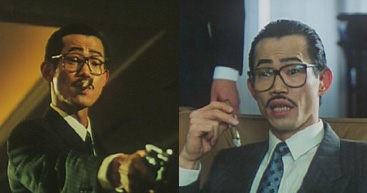 While in EASTERN CONDOR Wah appeared only in the
last third of the movie, DRAGONS FOREVER actually begins with Wah’s gangster
villain wasting James Tien who had been playing the recurrent crime kingpin
figure in nearly a dozen earlier Sammo’s productions; a very sly and tongue
in cheek way to introduce the character and show who the big boss was from
now on. For the bulk of the movie Wah makes only recurrent appearances
but with his gift for quirky comic characterisations he neatly steals all
his scenes.
While in EASTERN CONDOR Wah appeared only in the
last third of the movie, DRAGONS FOREVER actually begins with Wah’s gangster
villain wasting James Tien who had been playing the recurrent crime kingpin
figure in nearly a dozen earlier Sammo’s productions; a very sly and tongue
in cheek way to introduce the character and show who the big boss was from
now on. For the bulk of the movie Wah makes only recurrent appearances
but with his gift for quirky comic characterisations he neatly steals all
his scenes.
 For the film’s showdown a tantalizing little game
is played by Wah’s villain. As the fighting begins, Wah starts of course
by sending his cronies after the heroes while carefully remaining on the
side and only conducting brief sneaky attacks when Jackie is distracted
or off-balance in keeping with his character’s weasily ways. On a couple
of occasions Jackie throws Wah a menacing scowl and there’s some brief
fist and feet exchanges but never a sustained fight. Clearly Wah’s character
is a proficient fighter bursting with nervous energy and quite capable
but he is constantly put on hold frustrating the audience eager to see
Wah unleash. Instead Wah goes after the film’s leading lady sending her
through a glass plate head first then crushing her fingers with his foot.
Finally Sammo enters the picture and Wah begins by pounding him and then
takes an Eagle Claws stance. Having been sneakily injected with drugs however,
Wah starts having goofy convulsion, grinning facial contortions and takes
a slapstick pratfall. And so Yuen Wah’s part in DRAGON FOREVER actually
ends on this hilarious deflating comedic inversion of his EASTERN CONDORS
Vietcong commander turn.
For the film’s showdown a tantalizing little game
is played by Wah’s villain. As the fighting begins, Wah starts of course
by sending his cronies after the heroes while carefully remaining on the
side and only conducting brief sneaky attacks when Jackie is distracted
or off-balance in keeping with his character’s weasily ways. On a couple
of occasions Jackie throws Wah a menacing scowl and there’s some brief
fist and feet exchanges but never a sustained fight. Clearly Wah’s character
is a proficient fighter bursting with nervous energy and quite capable
but he is constantly put on hold frustrating the audience eager to see
Wah unleash. Instead Wah goes after the film’s leading lady sending her
through a glass plate head first then crushing her fingers with his foot.
Finally Sammo enters the picture and Wah begins by pounding him and then
takes an Eagle Claws stance. Having been sneakily injected with drugs however,
Wah starts having goofy convulsion, grinning facial contortions and takes
a slapstick pratfall. And so Yuen Wah’s part in DRAGON FOREVER actually
ends on this hilarious deflating comedic inversion of his EASTERN CONDORS
Vietcong commander turn.
 While he may have been discovered in EASTERN CONDORS,
it could arguably be said that it was Wah’s quirky crime-boss turn in DRAGON
FOREVER that really fully exposed his true potential as a versatile character
actor who didn’t need a sustained fight scene to work his special screen
magic. Yet despite Wah’s obvious affinity at playing lead villainous roles
it took him more than a year and a half before getting another such part.
In the mean-time Wah got back to being a busy action director on a handful
of Sammo produced movies; PAPER MARRIAGE, IN THE BLOOD, THREE AGAINST THE
WORLD, SPOOKY SPOOKY and MR VAMPIRE IV (all 1988). He also took on a string
of secondary roles in which he always gave a quite memorable turn; such
as a flesh-eating long whiskered spirit in PICTURE OF A NYMPH (88), a possessed
cop in SPOOKY SPOOKY and a gloriously fey attendant turned Gyoshi in MR
VAMPIRE IV.
While he may have been discovered in EASTERN CONDORS,
it could arguably be said that it was Wah’s quirky crime-boss turn in DRAGON
FOREVER that really fully exposed his true potential as a versatile character
actor who didn’t need a sustained fight scene to work his special screen
magic. Yet despite Wah’s obvious affinity at playing lead villainous roles
it took him more than a year and a half before getting another such part.
In the mean-time Wah got back to being a busy action director on a handful
of Sammo produced movies; PAPER MARRIAGE, IN THE BLOOD, THREE AGAINST THE
WORLD, SPOOKY SPOOKY and MR VAMPIRE IV (all 1988). He also took on a string
of secondary roles in which he always gave a quite memorable turn; such
as a flesh-eating long whiskered spirit in PICTURE OF A NYMPH (88), a possessed
cop in SPOOKY SPOOKY and a gloriously fey attendant turned Gyoshi in MR
VAMPIRE IV.
 Wah’s most “straight” role of the period, or even
of his whole career, was in the Yuen Biao vehicle ON THE RUN, where he’s
part of a quartet of ruthless crooked cops alongside Charlie Chin, Phillip
Ko Fei and Lo Lieh (who he had frequently doubled in his Shaw Brother days).
Relinquishing for the most part stunt oriented action in favour of film
noir atmosphere, drama and shootouts Wah doesn’t engage in any acrobatic
fights in this one. His character doesn’t actually talk or do that much
and he is seen usually standing behind his follow cronies but he cuts a
distinctive chilling figure. “Shoot him” he whispers at one point in fellow
crony Ko Fei’s ear as the latter aims a gun at a helpless Biao.
Wah’s most “straight” role of the period, or even
of his whole career, was in the Yuen Biao vehicle ON THE RUN, where he’s
part of a quartet of ruthless crooked cops alongside Charlie Chin, Phillip
Ko Fei and Lo Lieh (who he had frequently doubled in his Shaw Brother days).
Relinquishing for the most part stunt oriented action in favour of film
noir atmosphere, drama and shootouts Wah doesn’t engage in any acrobatic
fights in this one. His character doesn’t actually talk or do that much
and he is seen usually standing behind his follow cronies but he cuts a
distinctive chilling figure. “Shoot him” he whispers at one point in fellow
crony Ko Fei’s ear as the latter aims a gun at a helpless Biao.
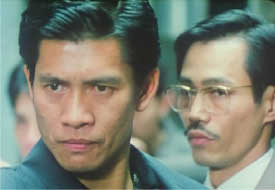
Wah’s big acting moment comes in the film’s
showdown where the tables are turned and it’s now Wah and his crooked pals
that are held at gun point by Yuen Biao and the film’s leading lady, Pat
Ha. Here his character reveals his true colors as a snivelling coward begging
and even crying for his life. Back in the 1993 Eastern Heroes interview
Wah singled out ON THE RUN as his third favourite film (after EASTERN CONDORS
and DRAGONS FOREVER because "I like the style of the film, and I think
that my acting is quite good in it because I get to give my character some
emotion instead of being told just to fight like a human prop ."(12)
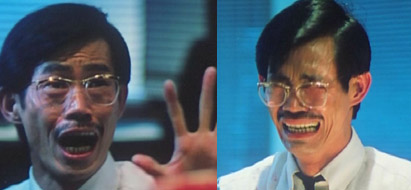
Magnificent King Villain
At long last Wah came back to a lead villainous
role with a vengeance in Yuen Biao’s action vehicle ICEMAN COMETH (Aug
89) as a wily fiendish Ming Dynasty swordsman, time-displaced to twentieth
century Hong-
Kong. With swords, fire-arms, wire-fu, stunts
and gruelling acrobatic k-f bouts, Wah delivered plentifully and with panache
in this hyper-kinetic action extraganza which he also choreographed alongside
Yuen Biao and another old Little Fortune brother Yuen Tak. Wah was also
on a rampage acting wise as well as hamming it up to the max with maniacal
glee, wicked laughs and snickering grins.
 Though his character clearly owed much to Clancy
Brown’s Barbaric Goth warrior seen in HIGHLANDER, one of ICEMAN COMETH’s
many movie models, Wah’s wily interpretation of it was all his own and
his most over the top performance ever. Yet even if his acting veered
dangerously into cartoony camp, Wah’s character never lost its edgy sense
of menace.
Though his character clearly owed much to Clancy
Brown’s Barbaric Goth warrior seen in HIGHLANDER, one of ICEMAN COMETH’s
many movie models, Wah’s wily interpretation of it was all his own and
his most over the top performance ever. Yet even if his acting veered
dangerously into cartoony camp, Wah’s character never lost its edgy sense
of menace.
 Although they had faced each other many times
before, it was ICEMAN COMETH that truly established Wah as
Although they had faced each other many times
before, it was ICEMAN COMETH that truly established Wah as
Biao’s stand-out screen nemesis. Sharing a
similar wiry body type and outstanding acrobatic screen-fighting skills,
they fit perfectly as antagonists. They would meet twice more in the next
several years. COMETH also actually played eerily with Biao and Wah's real
life Peking Opera Academy backgrounds as their characters in the movie
are two martial brothers sharing a family name Feng and are trained by
the same master as was actually the case in real life for both men (13).
Early in the film Wah shouts to Biao “We started practising since five.
We had to practise at dawn and could only sleep at midnight. It was not
human life. Twenty five years, we lead such a life. We finally practised
superb martial art". (14)
 For the Sammo produced SHE SHOOTS STRAIGHT (Apr
90), Wah played a vicious Vietnamese criminal. This was Wah’s last film
for Sammo. By the turn of the nineties H-K Cinema had gone through some
changes since Wah had rejoined his big brother six years earlier. The popular
appeal for bombastic, stunt-oriented capers was now fading and the era
of the “stuntmen as star” which had begun with k-f comedy and brought stardom
for Sammo, Jackie Chan and Yuen Biao, had come to pass. While Jackie remained
on top, both Sammo and Biao’s careers had now entered into steady decline.
No longer the leading force he once was, Sammo’s acting and producing activities
became erratic and he finally went into semi retirement himself in 1991.
By then most of his oldest acolytes and collaborators that he had used
through his golden days had gone their own ways.
For the Sammo produced SHE SHOOTS STRAIGHT (Apr
90), Wah played a vicious Vietnamese criminal. This was Wah’s last film
for Sammo. By the turn of the nineties H-K Cinema had gone through some
changes since Wah had rejoined his big brother six years earlier. The popular
appeal for bombastic, stunt-oriented capers was now fading and the era
of the “stuntmen as star” which had begun with k-f comedy and brought stardom
for Sammo, Jackie Chan and Yuen Biao, had come to pass. While Jackie remained
on top, both Sammo and Biao’s careers had now entered into steady decline.
No longer the leading force he once was, Sammo’s acting and producing activities
became erratic and he finally went into semi retirement himself in 1991.
By then most of his oldest acolytes and collaborators that he had used
through his golden days had gone their own ways.

Somewhat ironically however, the period that saw
Sammo lose his leading force/leading star standing were also those in which
Yuen Wah hit his stride as a magnificent king villain. With the aforementioned
ICEMAN COMETH and SHE SHOOTS STRAIGHT that were followed by his role as
a fierce “palm power” minion in SWORDSMAN (May 90) and a power mad military
dictator in BURY ME HIGH (Jan 91). While that last film and ICEMAN saw
Wah truly unleash his physical skills both SHE SHOOTS STRAIGHT and SWORDSMAN,
on the other hand, had Wah in only limited action or enhanced by wire-works
but this did not affect Wah’s edgy villain potency in the least. Evidently
Wah as a big movie villain was having a far easier time than his action
stars Fortune brothers.
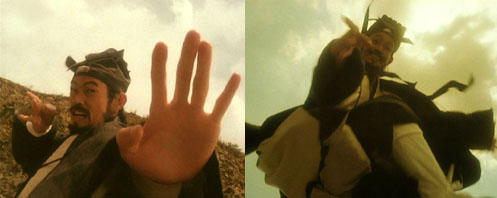 Wah’s greatest movie villain role he never played
was DRAGON FROM RUSSIA’s wily Master of Death. Indeed ICEMAN COMETH director
Clarence Fok had originally cast Wah to play the lead villain in his latest
frenzied actioner but he ended up working on the film only five days, his
face covered by a scarf in the brief couple of scenes he managed to do.
After Wah left (probably because of conflicting working obligations) his
role was taken over by the film’s action director Yuen Tak. A wacky acrobatic
assassin but also wicked taskmaster ruthlessly training pupils into becoming
killing machines, the Master of Death role had been tailor made to fit
Wah’s expertise in acrobatics and quirky characterisations. Such a character
would have given him the chance to play a role totally in the vein of those
wizened masters so prevalent in kung-fu comedies, only far more sinister
and deadly. While Yuen Tak’s own frantic acrobatic abilities more
than made-up for Wah’s departure action-wise, nothing could compensate
for Wah's flair in playing oddball villains. (15)
Wah’s greatest movie villain role he never played
was DRAGON FROM RUSSIA’s wily Master of Death. Indeed ICEMAN COMETH director
Clarence Fok had originally cast Wah to play the lead villain in his latest
frenzied actioner but he ended up working on the film only five days, his
face covered by a scarf in the brief couple of scenes he managed to do.
After Wah left (probably because of conflicting working obligations) his
role was taken over by the film’s action director Yuen Tak. A wacky acrobatic
assassin but also wicked taskmaster ruthlessly training pupils into becoming
killing machines, the Master of Death role had been tailor made to fit
Wah’s expertise in acrobatics and quirky characterisations. Such a character
would have given him the chance to play a role totally in the vein of those
wizened masters so prevalent in kung-fu comedies, only far more sinister
and deadly. While Yuen Tak’s own frantic acrobatic abilities more
than made-up for Wah’s departure action-wise, nothing could compensate
for Wah's flair in playing oddball villains. (15)
Instead of playing one of the most maniacal
martial art masters ever, Wah played one of the straightest instead when
Tsui Hark cast him in Jet Li’s action vehicle THE MASTER as Jet’s own San
Francisco settled beleaguered k-f teacher. A bone settler and herbalist
who headed a Po Chi Lam dispensary, besides being a kung-fu expert, Wah’s
master effectively played a sort of modern-day Wong-Fei-hung, the polar
opposite of his then customary villains and consequently this is probably
one of his most off-beat roles up to that point in his career. He also
staged the film's action alongside Yuen Clan brother Brandy Yuen and although
Jet Li is the star, Wah was given a couple of action scenes to do including
a one against many fight for the film’s finale.
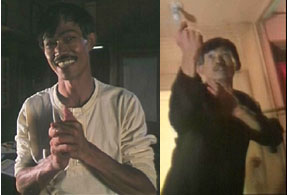 Unfortunately, none of the action either by Jet
or him really stands out (not in the way it did in ICEMAN COMETH or EASTERN
CONDORS anyway). Wah’s character is in a foul mood through most of the
movie which is pretty clunky overall. In fact, the film was considered
so poor by its makers that it was kept on the shelves for a couple of years
before being released in May 1992 after the huge success of ONCE UPON A
TIME IN CHINA.
Unfortunately, none of the action either by Jet
or him really stands out (not in the way it did in ICEMAN COMETH or EASTERN
CONDORS anyway). Wah’s character is in a foul mood through most of the
movie which is pretty clunky overall. In fact, the film was considered
so poor by its makers that it was kept on the shelves for a couple of years
before being released in May 1992 after the huge success of ONCE UPON A
TIME IN CHINA.
 Like ICEMAN COMETH, MASTER had some eerie parallels
with Wah’s own real-life background. Wah’s own master immigrated to America
once he was done training the Little Fortunes. Back in 1988 a movie was
made about Master Yu and the Little Fortunes titled PAINTED FACES where
it was big brother Sammo who played the master. Shortly after the movie
was released, Master Yu briefly came back to Hong-Kong for a special celebration
party with his former students before going back to what was now his home
in the US. It might very well be that it was Master Yu’s story which inspired
Tsui Hark to come up with this kung-fu master in America premise. So did
Wah draw inspiration from his own Master to play his role in Tsui Hark's
film? As the latter is depicted as a tough, moody yet deep down caring
man it seems at least a distinct possibility. The other strong parallel
between movie and real life was that Wah in 1991 resettled his family to
Canada due to concerns about the 1997 Handover. Although he remained behind
in Hong Kong to make movies he still spent at least some amount of time
abroad.
Like ICEMAN COMETH, MASTER had some eerie parallels
with Wah’s own real-life background. Wah’s own master immigrated to America
once he was done training the Little Fortunes. Back in 1988 a movie was
made about Master Yu and the Little Fortunes titled PAINTED FACES where
it was big brother Sammo who played the master. Shortly after the movie
was released, Master Yu briefly came back to Hong-Kong for a special celebration
party with his former students before going back to what was now his home
in the US. It might very well be that it was Master Yu’s story which inspired
Tsui Hark to come up with this kung-fu master in America premise. So did
Wah draw inspiration from his own Master to play his role in Tsui Hark's
film? As the latter is depicted as a tough, moody yet deep down caring
man it seems at least a distinct possibility. The other strong parallel
between movie and real life was that Wah in 1991 resettled his family to
Canada due to concerns about the 1997 Handover. Although he remained behind
in Hong Kong to make movies he still spent at least some amount of time
abroad.
Kung-Fu Jester
Although Wah had given quirky comedic overtones
to most of his villains, even the more despicable, it was not until the
dawn of the nineties that he truly embraced self-parody and comedic roles.
This allowed him not only to send-up his usual fierce bad guy roles but
to lighten up his token screen image as well. Thus in KUNG-FU VS ACROBATIC
(July 90) he plays another time displaced ancient warrior with powerful
palm power who is confused by the modern world especially when watching
TV. Wah’s doltish expression and goofy moustache are priceless while his
slapstick hiijnks are the highlight of this other-wise largely dull offering.
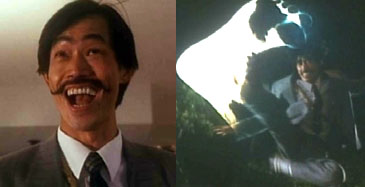 For the Stephen Chow movie MAGNIFICENT SCOUNDRELS
(Oct 91) Wah is a dopey triad enforcer who ends up unwittingly beating
up his own boss. Wah is all fierce and snarling in THE BIG DEAL (Nov 92)
viciously beating and fighting everyone who gets in his way but it’s all
for a laugh in this totally zany fighting girls send up which also sees
him wearing the most garishly flamboyant suits ever and at one point he
is even seen in a delicate situation on a toilet bowl. As a tempestuous
master thief seeking to settle the score with his despised martial brother
(Yuen Clan’s Yuen Cheung-yan), Wah ends up fighting the man’s loony pupils
Moon Lee and Yukari Oshima as well as the interloping wacky policewoman
Sibelle Hu for the finale set in an amusement park. At one point they all
gang up on him but Wah in a dazzling whirlwind display of action repels
them all, forcing his adversaries to come up with a new, if somewhat cartoony
tactic to defeat him.
For the Stephen Chow movie MAGNIFICENT SCOUNDRELS
(Oct 91) Wah is a dopey triad enforcer who ends up unwittingly beating
up his own boss. Wah is all fierce and snarling in THE BIG DEAL (Nov 92)
viciously beating and fighting everyone who gets in his way but it’s all
for a laugh in this totally zany fighting girls send up which also sees
him wearing the most garishly flamboyant suits ever and at one point he
is even seen in a delicate situation on a toilet bowl. As a tempestuous
master thief seeking to settle the score with his despised martial brother
(Yuen Clan’s Yuen Cheung-yan), Wah ends up fighting the man’s loony pupils
Moon Lee and Yukari Oshima as well as the interloping wacky policewoman
Sibelle Hu for the finale set in an amusement park. At one point they all
gang up on him but Wah in a dazzling whirlwind display of action repels
them all, forcing his adversaries to come up with a new, if somewhat cartoony
tactic to defeat him.
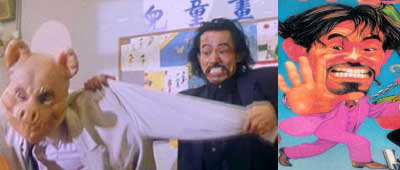 Wah’s stand out comedy role (and even perhaps
his stand out role of the early nineties period) was in LEGEND OF THE DRAGON
(Mar 91) as Stephan Chow’s stern, righteous but hot tempered father named
Chow Fei-hung (as in Wong Fei-hung of course). A guileless country bumpkin
patriarch who makes wine out of fermented dead mice and is not too current
about the modern world, Wah truly excels in a dead pan manner playing this
father figure who hides his deep love for his son behind a severe outlook
and angry outbursts. LEGEND was another of those movies to make an odd
nod to Wah’s past history by having his character be Bruce Lee’s long time
martial brother and acrobatic double - a connection Master Chow is always
quite fond to relate and remind other people.
Wah’s stand out comedy role (and even perhaps
his stand out role of the early nineties period) was in LEGEND OF THE DRAGON
(Mar 91) as Stephan Chow’s stern, righteous but hot tempered father named
Chow Fei-hung (as in Wong Fei-hung of course). A guileless country bumpkin
patriarch who makes wine out of fermented dead mice and is not too current
about the modern world, Wah truly excels in a dead pan manner playing this
father figure who hides his deep love for his son behind a severe outlook
and angry outbursts. LEGEND was another of those movies to make an odd
nod to Wah’s past history by having his character be Bruce Lee’s long time
martial brother and acrobatic double - a connection Master Chow is always
quite fond to relate and remind other people.
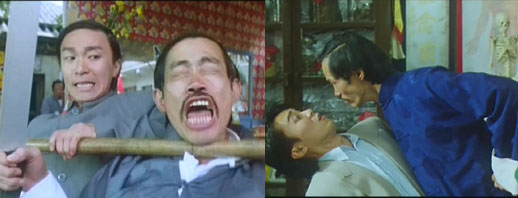 Wah trounces a couple of people in the movie but
engages in only a brief fight testing his son; loving dad that he is by
a sneaky attack with a rod, a chain and a knife. Wah choreographed the
film with Corey Yuen and this was to be his last recorded work in the field
of action staging. From then on, Wah would be completely finished with
his old vocations of action-director and stunt-double. Beyond the film’s
comedy content and (brief) action, Master Chow also had a couple of scenes
showing a tender, touching and vulnerable side to him that reveals a fresh
and surprising facet of Wah’s acting that was as far removed from his usual
maniac villains role as it could possibly be.
Wah trounces a couple of people in the movie but
engages in only a brief fight testing his son; loving dad that he is by
a sneaky attack with a rod, a chain and a knife. Wah choreographed the
film with Corey Yuen and this was to be his last recorded work in the field
of action staging. From then on, Wah would be completely finished with
his old vocations of action-director and stunt-double. Beyond the film’s
comedy content and (brief) action, Master Chow also had a couple of scenes
showing a tender, touching and vulnerable side to him that reveals a fresh
and surprising facet of Wah’s acting that was as far removed from his usual
maniac villains role as it could possibly be.
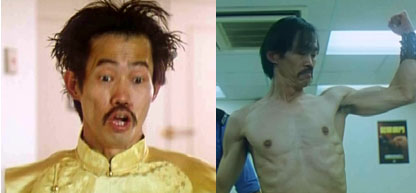
The Black Panther
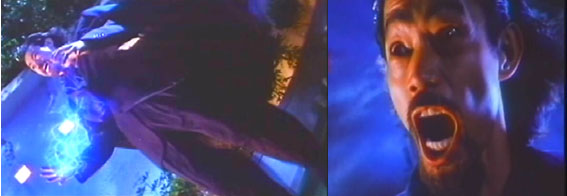
Despite his many ventures in comedies or as
comic villains, Yuen Wah still remained a dependable edgy screen villain.
Thus he was recalled by little brother Yuen Biao to serve as his screen
nemesis once again for his directorial debut KID FROM TIBET (Jan 82), as
the black clothed, lightning bolt throwing “Dark Lama”. Wah actually sported
a newly grown goatee and mane of hair for that movie which made him appear
fiercer than ever, almost like a human lion, a peculiar look he was to
carry for a couple of movies.
 While much smaller scale than the ICEMAN COMETH,
KID FROM TIBET was still more than adequately sparkling and intense showing
the two former Fortune brothers in splendid fighting shape. One year later
Wah was cast one last time as Biao’s nemesis for the ONCE UPON A TIME IN
CHINA-like yarn titled KICKBOXER (Feb 93). By then the goatee was gone
and Wah had shaved his hair to get the appropriate Qing dynasty look for
his role as a devious businessman who is actually a drug trafficker. Totally
wire-work oriented, this film’s fight finale only allowed a fleeting glimpse
of Biao’s and Wah’s formidable physicality and this third big showdown
between the two turned out to be their most lacklustre and disappointing
encounter. Alas it was also to be their last.
While much smaller scale than the ICEMAN COMETH,
KID FROM TIBET was still more than adequately sparkling and intense showing
the two former Fortune brothers in splendid fighting shape. One year later
Wah was cast one last time as Biao’s nemesis for the ONCE UPON A TIME IN
CHINA-like yarn titled KICKBOXER (Feb 93). By then the goatee was gone
and Wah had shaved his hair to get the appropriate Qing dynasty look for
his role as a devious businessman who is actually a drug trafficker. Totally
wire-work oriented, this film’s fight finale only allowed a fleeting glimpse
of Biao’s and Wah’s formidable physicality and this third big showdown
between the two turned out to be their most lacklustre and disappointing
encounter. Alas it was also to be their last.
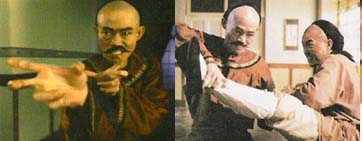 Between the two Biao films, Wah was also cast
as a lead villain in Jackie Chan’s POLICE STORY III (July 92).
Between the two Biao films, Wah was also cast
as a lead villain in Jackie Chan’s POLICE STORY III (July 92).
This was Wah’s first screen encounter with
his more famous Fortune brother since DRAGONS FOREVER and the one role
he did in one of Jackie’s films (DRAGON being a Three Brothers movie directed
by Sammo doesn’t count). In the film Wah plays Panther a ruthless criminal
who undercover policeman Jackie helps escape from prison and pretends to
befriend so that he can lead him to his boss. Shown as a cold ruthless
killer, Wah’s character added an element of edgy danger because of the
deception pulled on him by Jackie. Otherwise though, his use is rather
limited. Whenever the action kicks in Panther is usually briefly shown
being “busy” but the focus remains steadily on either Jackie or his female
co-star Michelle Yeoh.
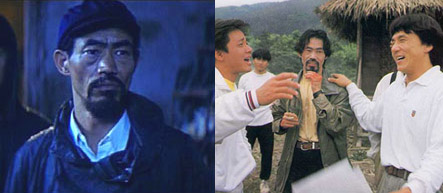 In the course of the film’s finale Jackie, Yeoh
and Wah do end up facing off against each other but a spectacular fight
never materialises. Jackie’s brand of action was the one against many whirlwind
fights and the hair raising dangerous stunt but not the one to one fight
which was of course what Yuen Wah was great at. So Panther is actually
quite casually disposed of after having made barely a move, and Jackie
goes on to do the film’s big stunt set-piece of dangling from a helicopter’s
ladder in mid-air. Watching the movie a new viewer of H-K cinema would
have never guessed that Yuen Wah was actually one of H-K’s top screen fighters
and one quirky character actor, which is exactly what happens when POLICE
was dubbed, re-cut and re-titled SUPERCOP for a theatrical release in the
West. As he played an important supporting role it can’t be said that Yuen
Wah was wasted. Still the way he was used can be deemed as quite uninspired
considering the man’s considerable talent. Sadly, POLICE STORY III was
also Yuen Wah’s last major action movie.
In the course of the film’s finale Jackie, Yeoh
and Wah do end up facing off against each other but a spectacular fight
never materialises. Jackie’s brand of action was the one against many whirlwind
fights and the hair raising dangerous stunt but not the one to one fight
which was of course what Yuen Wah was great at. So Panther is actually
quite casually disposed of after having made barely a move, and Jackie
goes on to do the film’s big stunt set-piece of dangling from a helicopter’s
ladder in mid-air. Watching the movie a new viewer of H-K cinema would
have never guessed that Yuen Wah was actually one of H-K’s top screen fighters
and one quirky character actor, which is exactly what happens when POLICE
was dubbed, re-cut and re-titled SUPERCOP for a theatrical release in the
West. As he played an important supporting role it can’t be said that Yuen
Wah was wasted. Still the way he was used can be deemed as quite uninspired
considering the man’s considerable talent. Sadly, POLICE STORY III was
also Yuen Wah’s last major action movie.
Declining Fortune
After 1992, Wah considerably reduced his workload.
Until then his average output was five movies a year, but in 1993 he appeared
in only two and none in 1994. The reason for Wah’s extended hiatus is not
known but had probably to do with a desire to have more time with his family.
After being a performer for more than thirty years he more than deserved
the respite. A lack of good roles may also have had something to do with
his extended leave. By the mid nineties most of the Eighties action players’
careers had faltered and Yuen Biao even joined Sammo in semi-retirement.
Hong-Kong cinema itself had begun a period of general uncertainty and decline
and most of the kung-fu and stunt-oriented action films the local film
industry now delivered took the shape of low budgeted, slapdash actioners.
Wah appeared in two of those in 1995. Reprising his dapper suited gangster
look he had used for DRAGONS FOREVER, Wah was the lead (but reportedly
underused) villain in DRUG FIGHTERS (May 95) and got to do an extended
battle with the film female action lead Yukari Oshima in what an admirer
of the fierce Japanese nutcracker deemed to be one of her absolute best
fights (16).
Wah also had a guest role in TOUGH BEAUTY AND THE SLOPPY SLOP (Dec 95)
as another weasily k-f fighting drug trafficker where he got to briefly
engage Cynthia Khan in her introductory action scene.
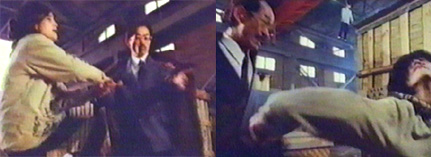 In between those two films Wah made a welcome
return to a comic character in the romantic comedy ONLY FOOLS FALL IN LOVE
(Sept 95) where he played the leading lady’s (Wu Chien-lien) bumbling father
and got to show once more just what a delightful comedian he could be.
A brief throwaway scene where he does head flips also show how uncannily
springy he still was even in his forties.
In between those two films Wah made a welcome
return to a comic character in the romantic comedy ONLY FOOLS FALL IN LOVE
(Sept 95) where he played the leading lady’s (Wu Chien-lien) bumbling father
and got to show once more just what a delightful comedian he could be.
A brief throwaway scene where he does head flips also show how uncannily
springy he still was even in his forties.
 He reprised a fairly similar bumbling sidekick
role two years later in HERO (July 97) except that here he played an older
brother instead of a father. Directed by Corey Yuen, the film was a sort
of Little Fortunes reunion as it cast four of them in supporting roles;
Yuen Biao, Yuen Wah, Yuen Tak (also the film’s action director) and Corey
Yuen himself. They are never seen all together though, but at least there
is some nice comic banter between Corey Yuen and Wah.
He reprised a fairly similar bumbling sidekick
role two years later in HERO (July 97) except that here he played an older
brother instead of a father. Directed by Corey Yuen, the film was a sort
of Little Fortunes reunion as it cast four of them in supporting roles;
Yuen Biao, Yuen Wah, Yuen Tak (also the film’s action director) and Corey
Yuen himself. They are never seen all together though, but at least there
is some nice comic banter between Corey Yuen and Wah.

Wah TV
The second half of the nineties saw the Hong
Kong cinema situation degrade further for a variety of reasons. Wah made
only sporadic returns to films after 1995. Quite clearly the movies now
offered him nothing new or even perhaps nothing good for him to do. Many
martial art/action players have found new opportunities on television once
their movie careers faltered which is what happened with Wah. In 1996 he
was given a part for the Hong Kong TV station TVB serial Night Journey
as a Taoist wizard turned cop in early Republic China. Warmly received
by the audience the serial's success gave a new lease of life to Wah’s
career. TVB being the TV branch of the greater Shaw Brother Empire,
Wah’s new TV career marked his return within the Shaw fold, nearly three
decades after he first entered as a young stuntman and twelve years after
he had left it back in 1984 to join Sammo’s Hung Kar Pan. So in a way Wah
had come full circle.
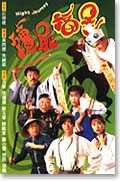 Despite his new career on TV Wah did not completely
let go of movies. In 1998 he played another spectacle, cigar chewing crime
boss for the low-budget pot-boiler LEOPARD HUNTER and the finale sees him
take on action females Jade Leung, Yukari Oshima and four other female
cops in what is described as a “terrific match-up” . In 2000 Wah appeared
in the ghost movie DEVIL SHADOW and the following year he played an evil
wizard in the VAMPIRE CONTROLLER where he sported a new shaved moustache
look. Wah followed this with ULTIMATUM (01). All of these last movies quickly
came and disappeared without making much of an impression.
Despite his new career on TV Wah did not completely
let go of movies. In 1998 he played another spectacle, cigar chewing crime
boss for the low-budget pot-boiler LEOPARD HUNTER and the finale sees him
take on action females Jade Leung, Yukari Oshima and four other female
cops in what is described as a “terrific match-up” . In 2000 Wah appeared
in the ghost movie DEVIL SHADOW and the following year he played an evil
wizard in the VAMPIRE CONTROLLER where he sported a new shaved moustache
look. Wah followed this with ULTIMATUM (01). All of these last movies quickly
came and disappeared without making much of an impression.
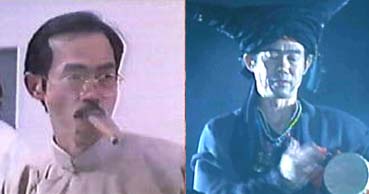 One year after Night Journey Wah was cast in another
period serial titled Drunken Angels. Other TV productions starring
Wah since then include Plain Love II and III, Country Spirit, God of Honour
and a Place of One’s Own. Some of them have a contemporary setting. Wah
also at one point did a TV commercial about condoms. Nowadays in Hong Kong
Wah is far better recognized as a TV actor then a movie villain, although
in the West it’s still this image that predominates.
One year after Night Journey Wah was cast in another
period serial titled Drunken Angels. Other TV productions starring
Wah since then include Plain Love II and III, Country Spirit, God of Honour
and a Place of One’s Own. Some of them have a contemporary setting. Wah
also at one point did a TV commercial about condoms. Nowadays in Hong Kong
Wah is far better recognized as a TV actor then a movie villain, although
in the West it’s still this image that predominates.
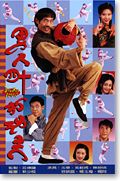 Wah had not done a movie in three years until
he was recently cast in Stephan Chow’s KUNG FU HUSTLE. Now entering his
fifth decade (or about to) Wah may have passed his prime physically but
he still remains a gifted character actor and there’s every chance that
he might still give the audience other delightful and surprising “Wwwaaahhhh”
moments.
Wah had not done a movie in three years until
he was recently cast in Stephan Chow’s KUNG FU HUSTLE. Now entering his
fifth decade (or about to) Wah may have passed his prime physically but
he still remains a gifted character actor and there’s every chance that
he might still give the audience other delightful and surprising “Wwwaaahhhh”
moments.

Footnotes:
1. “The Prince Of Darkness;
an interview with Yuen Wah” found in SWORDSMAN Hong-Kong Legend Edition.
2. Thanks to both Jun Yan
and King Wei for this translation bit.
3. Jackie Chan/Jeff Yang
I AM JACKIE CHAN MY LIFE IN ACTION pp 78-79
4. Prince of Darkness Interview
with Yuen Wah
5. The Best of Eastern Heroes;
YUEN WAH COMETH; Yuen Wah Interview; pp 114
6. Yuen Wah Interview; MAGIC
BLADE Celestial DVD edition.
7. Yuen Wah Interview; MAGIC
BLADE Celestial DVD edition.
8. Yuen Wah Interview; MAGIC
BLADE Celestial DVD edition.
9. Bey Logan HONG KONG ACTION
CINEMA pp: 96.
10. The Best of Eastern Heroes; YUEN
WAH COMETH pp 112
11. Wah reprised his Vietcong commander
act for an EASTERN CONDORS musical number done for theTVB Miss Hong-Kong
beauty Pageant. He would also play another ominous commie official later
on for the “God of Gambler” type comedy TOP BET (91) starring Anita Mui
and Carol Cheng directed by Fortune Brother Corey Yuen.
12. The Best of Eastern Heroes; YUEN
WAH COMETH; pp:115
13.. Feng is most likely the name of
their master which the characters bear as tribute to him the same as Yuen
Wah and Yuen Biao did in real life. This is not actually stated in
the movie and the master remains nameless ( in the subtitles anyway)
but given the nature of the relationship of the characters between them
this is a most likely supposition.
14. Iceman Cometh
15. Fok also considered at one point
casting Yuen Biao as the film’s hero (that ended-up being played by Sam
Hui) so with Maggie Cheung playing the love interest, DRAGON FROM RUSSIA
almost reunited the acting threesome of ICEMAN COMETH.
16. Yukari Oshima Overview by T. P Hong
Kong Cinema Special Features http://brns.com/yukari/Yukari1.html
Sources
Literary
-The Best of Eastern Heroes; YUEN WAH COMETH;
Yuen Wah Interview;
-Bey Logan HONG KONG ACTION CINEMA.
-Jackie Chan/Jeff Yang I AM JACKIE CHAN MY
LIFE IN ACTION
-John Charles, Hong Kong Filmography 1977-97
-Stephan Hammond Hollywood East
Video
-The Prince Of Darkness; an interview with
Yuen Wah” found in SWORDSMAN Hong-Kong Legend Edition.
-Yuen Wah Interview; MAGIC BLADE Celestial
DVD edition
Web sites.
-Hong Kong Movie Database; http://www.hkmdb.com/db/people/view.mhtml?id=4886&display_set=eng
-The Best Flipping Actor Yuen Wah; http://www.compusmart.ab.ca/suisum/yuenwah.html
-Wah, Pat Cooghan, BC Magazine http://hk.bcmagazine.net/cgi-bin/output.cgi?issue=132&&id=25
Discontinued ?.
-Yuen Wah Spendid Hong Kong Cinema Screen
Villains. http://www.yuenwah.com. Seemingly discountinued
-HKMania: http://www.hkmania.com/yuenwah.html
-Bejing Video http://www.beijingvideo.com/bjv/v127.html
-Hong Kong Cinema View From the Brooklyn Bridges
http://brns.com/
-Kung-Fu Cinema http://www.kungfucinema.com/index.html
